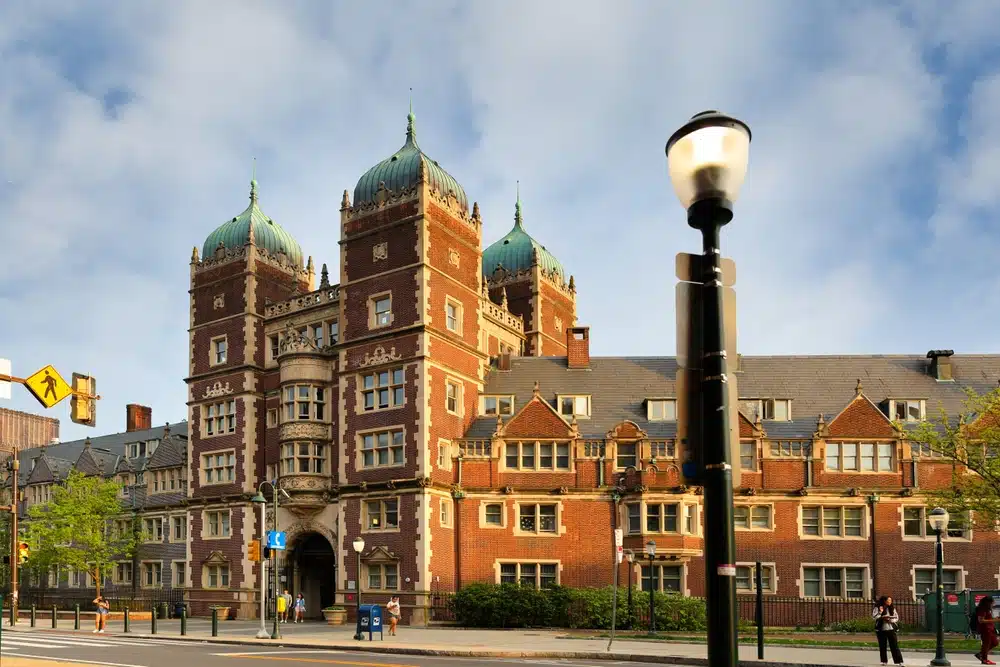Exploring the Unique Traditions of UPenn
Universities across the globe are known not only for their academic excellence but also for the richness of their traditions. These traditions lend a unique character to the institutions and play an integral part in shaping their students’ life experiences. The University of Pennsylvania, one of the most prestigious Ivy League institutions in the United States, is one such university rich in traditions that have evolved and grown over the years. This article delves into these traditions, exploring their significance, impact on students and alumni, and how they adapt to the modern era.
A Brief History of the University of Pennsylvania
The University of Pennsylvania, with its deep roots in America’s educational history and tradition, boasts a rich past that has directly influenced its present-day practices. Founded by Benjamin Franklin in 1740, the university was initially created to provide practical education for public service and commerce, a departure from the traditional religious-based education of the time. Over the centuries, the University of Pennsylvania has been shaped by world events, continual growth, and an enduring commitment to intellectual rigor.
Benjamin Franklin, a polymath and one of the United States’ Founding Fathers, envisioned a university that would prepare students for the challenges of the rapidly changing world. His vision was realized when the University of Pennsylvania, also known as UPenn, opened its doors to students. Franklin believed in the power of education to transform individuals and society, and he wanted to create an institution that would foster critical thinking, practical skills, and a spirit of innovation.
The university faced numerous challenges in its early years, including long periods of disruptive administrative and academic instability. Despite these challenges, it evolved and grew, laying a foundation for diverse and nuanced traditions. As the university weathered these storms, it emerged stronger and more resilient, shaping its identity as a place of intellectual curiosity and academic excellence.
The university’s approach to education, which was more secular and pragmatic than the norm, drew students from different backgrounds, thus creating a more inclusive and diverse study setting. This frame also led to the development a unique culture at UPenn that has persisted till today. Students from various walks of life came together to learn, exchange ideas, and challenge each other’s perspectives, creating a vibrant intellectual community.
As the university grew and changed, so did its traditions. Some emerged organically from student life and activities, while others were deliberately created to foster a sense of community and reinforce university values. These traditions became an integral part of the UPenn experience, shaping the lives of students and alumni alike.
One such tradition is the spirited sports events that unite the UPenn community. From cheering on the Quakers at Franklin Field to supporting the basketball teams at the Palestra, students, and alumni have always been passionate about their athletic teams. These events showcase UPenn athletes’ talent and dedication and foster camaraderie and school spirit.
Another cherished tradition is Ivy Day, a celebration that marks the end of the academic year and students’ transition from one class to the next. Ivy Day is a time-honored tradition where seniors pass down ivy chains to the junior class, symbolizing the continuity and growth of knowledge and wisdom. It is a day filled with pride, reflection, and anticipation for the future.
Homecoming and Reunion traditions also hold a special place in the hearts of UPenn students and alumni. Homecoming brings together current students, alumni, and their families for a weekend of festivities, including a football game, tailgating, and reunions. It is a time to reconnect with old friends, reminisce about college memories, and celebrate the enduring spirit of Penn.
Whether it is enjoying a toast with seniors during Hey Day or partaking in the vibrant Homecoming and Reunion traditions, these practices are cherished by students and alumni alike, creating lifelong memories and a strong sense of belonging. The traditions at the University of Pennsylvania are not just events; they are an integral part of the UPenn experience, connecting generations of students and alumni and fostering a deep sense of pride in being a member of the UPenn community.
The Significance of Traditions in Campus Life
The traditions at UPenn are not mere rituals; they carry a more profound significance by fostering a sense of community, building unity among the diverse student body, and enhancing the overall student experience.
Fostering a Sense of Community
Traditions such as Hey Day, the Throwing of Toast at football games, and Ivy Day celebrations are not just events but collective experiences that unite students. These traditions foster a unique sense of community that transcends the boundaries of individual classes, faculties, and cohorts. They usher in a feeling of oneness and camaraderie among the students, creating an environment of mutual respect and bonding.
Imagine the excitement as students gather on Hey Day, donning red shirts and caps, ready to celebrate their place in the UPenn community. The campus buzzes with anticipation as students from all walks of life come together to commemorate their journey and embrace their shared identity. The throwing of toast at football games becomes a symbol of unity, as students cheer on their team while simultaneously connecting with classmates through this quirky tradition. On Ivy Day, the campus transforms into a vibrant tapestry of green as students honor the past and embrace the future, symbolizing growth and renewal.
These social events encourage students to leave their academic shells, engage with their peers, and celebrate their shared experiences. They form an essential part of the UPenn culture, knitting together a community of diverse individuals with a shared identity.
Enhancing Student Experience
Traditions at UPenn greatly enhance the overall student experience. They provide a break from academics, offer opportunities for social interaction, and create memorable moments. These traditions also instill a sense of school spirit and pride in students, leaving lasting impressions long after graduation.
Picture the joy and laughter that fill the air during these traditions. Students come together to celebrate their academic achievements and create memories that will last a lifetime. The energy and enthusiasm are contagious as students participate in these time-honored rituals, forging connections and friendships that extend far beyond the boundaries of the campus.
As they participate in these events year after year, students get a sense of progression and growth. They witness the passing of the torch from one generation to the next as seniors pass down their knowledge and experiences to underclassmen. These traditions become a part of their narratives, shaping their journeys and contributing to their growth as individuals.
Moreover, these traditions serve as reminders of UPenn’s rich history and heritage. Students become part of a legacy that stretches back decades, connecting them to the past and inspiring them to create their mark on the university. The traditions become a thread that weaves the past, present, and future, making a sense of continuity and belonging.
In conclusion, the traditions at UPenn go beyond surface-level rituals. They are the lifeblood of the campus community, fostering a sense of unity, creating memorable experiences, and leaving a lasting impact on the students. These traditions are the heart and soul of the UPenn experience, shaping the students’ journey and creating a sense of belonging that extends far beyond their time on campus.
Overview of Unique UPenn Traditions
UPenn is renowned for its unique and enduring traditions, which draw in students, alumni, faculty, and staff. They are exciting, engaging, and a testament to the vibrant life at the university.
From the lively Hey Day parade to the quirky Throwing of Toast at football games, UPenn traditions are deeply ingrained in the fabric of campus life. These traditions bring the community together and serve as symbols of unity, transition, and celebration.
Hey Day and the Senior Class Toast
Hey Day is a significant tradition at UPenn. Held annually in April, it celebrates the passage of juniors to their senior year. Students parade down Locust Walk, donned in traditional straw hats and carrying canes, in an event filled with fun, photo opportunities, and a sense of camaraderie. The atmosphere is electric as the campus buzzes with excitement, marking the beginning of the end for the graduating class.
Following the Hey Day parade, the Senior Class Toast takes place, further solidifying the bond among the seniors. This significant event brings together the graduating class to raise a glass in the spirit of togetherness and anticipation for their final year at UPenn. It is a moment of reflection, where students share memories and aspirations, creating lasting connections that will carry them through their post-graduation journeys.
Hey Day and the Senior Class Toast serve as celebrations and symbols of unity and transition that strengthen bonds among students, marking a journey toward the close of their time at UPenn.
The Throwing of Toast at Football Games
One of the quirkiest traditions at UPenn is the Throwing of Toast during home football games. This tradition, a nod to the University’s ban on alcohol, began in the 1970s when students started throwing toast onto the field while singing the University’s anthem, “Drink a Highball.”
What started as a playful act has now evolved into a spectacle involving thousands of slices of toast being hurled onto the field. The crowd erupts in laughter and cheers as the toast rains down, creating a unique and memorable experience for everyone present. This tradition has become a distinctive part of the UPenn community culture, showcasing the creativity and humor of its students.
The Throwing of Toast not only adds an element of fun to the football games but also serves as a reminder of the University’s history and its ability to embrace unconventional traditions.
Ivy Day Celebrations
Another cherished tradition at UPenn is the Ivy Day celebrations. Held the day before Commencement, this celebration is a tribute to the outgoing senior class. The students gather to plant the class ivy and unveil the class monument, creating a moment of reflection and unity.
Ivy Day has been observed for over a hundred years, becoming integral to UPenn’s rich history. The planting of the class ivy symbolizes the growth and transformation experienced by the students throughout their time at the university. It serves as a reminder of the link between generations of UPenn students and the enduring legacy they leave behind.
Ivy Day provides a fitting send-off to the graduating class and acts as a bridge, cushioning their leap from student life to the world beyond. It is a time of celebration, nostalgia, and gratitude for the memories made and the friendships formed during their time at UPenn.
The Role of Traditions in Alumni Engagement
The traditions at UPenn don’t stop at graduation; they continue to play a crucial part in maintaining connections with the university’s over 300,000 alumni worldwide.
Homecoming and Reunion Traditions
Homecoming is a pivotal event at UPenn, drawing thousands of alumni back to the campus. Homecoming traditions include class reunions, sports events, academic talks, and much more, providing an opportunity to reconnect with classmates, faculties, and the university.
Similarly, class reunions, held annually, provide a platform for classmates to revive old memories, rekindle connections, and stay updated with the happenings at UPenn. They also offer alumni a chance to revisit their traditions and re-experience the joy and nostalgia associated with them.
Legacy and Philanthropy
Alumni play a vital role in sustaining UPenn’s traditions through legacy and philanthropy. They pass their memories and experiences to future generations, keeping the rules alive. Additionally, their donations and support aid in the continued growth and development of the university and its traditions.
Higher education institutions like UPenn realize that engaged alumni can significantly contribute to their progress, and traditions play an essential role in this engagement. They serve as a bridge between the institution and its alumni, ensuring a continued relationship that benefits both parties long after graduation.
The Future of Traditions at UPenn
As we look towards the future, Penn continues to cherish its traditions while adapting and evolving them to align with the changing times and needs of its students and alumni.
Adapting Traditions to a Modern Era
In a rapidly evolving world, traditions, too, need to adapt and change. This has been evident at UPenn, where the university has strived to ensure its practices remain inclusive, relatable, and engaging for the new generations.
From modifying the format of traditional events in response to the COVID-19 pandemic to introducing elements that cater to students’ changing interests and needs, the university has shown an openness to evolve while staying true to its roots.
New Traditions on the Horizon
Even as it cherishes its long-standing traditions, UPenn fosters new ones. These new traditions reflect the dynamic nature of the university and its thriving community that continues to innovate, create, and inspire.
The future promises exciting new beginnings and enduring traditions, solidifying UPenn’s status as a university that cherishes its past while continuously looking forward. In the years to come, the University of Pennsylvania is committed to nurturing its unique traditions, adapting them to the changing times, and creating new practices to celebrate its community, history, and future.
If you want to discuss the matter to a greater extent or inquire about college admissions, look no further! Our experts here at AdmissionSight can help you! Here at AdmissionSight, we have over a decade’s worth of experience guiding students through the competitive admissions process to get accepted to the top universities in the world. Feel free to set up an appointment today to book your initial consultation.









































